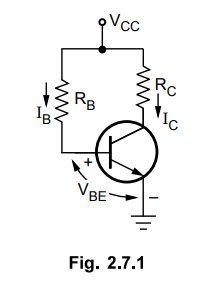Electron Devices and Circuits: Unit II: (a) Bipolar Junction Transistors (BJT)
Stability Factor
Bipolar Junction Transistors (BJT)
• We know that, the IC is a Unction of ICO, VBE and P Thus, it is convenient to introduce the three partial derivatives of IC with respect to these variables. These derivates are called stability factors S, S' and S" and are defined as follows :
Stability Factor
•
We know that, the IC is a Unction of ICO, VBE and P Thus, it is convenient to
introduce the three partial derivatives of IC with respect to these variables.
These derivates are called stability factors S, S' and S" and are defined
as follows :

Important
Concept
1.
Ideally, stability factor should be perfectly zero to keep operating point
stable.
2.
Practically stability factor should have the value as minimum as possible.
Thermal stability of a circuit is assessed by deriving a stability factor, S.
3.
Stability factor indicates the degree of change in operating point due to
variation in temperature.
1. Standard Equation for Derivation
•
For a common emitter configuration collector current is given as,

When
ICBO changes by ΔICand ICBO, IB
changes by ∂ IB and IC .So this equation becomes,

•
The above equation can be considered as a standard equation for derivation of
stability factors of other biasing circuits.
Important
Concept
The
general procedure to obtain stability factors for various biasing circuits is
as follows :
Step
1 : Obtain the expression for Ig.
Step
2 : Obtain 3 IB I 3 lc and use it in equation 5 to get
S.
Step
3 : In standard equation of Ic, replace lg in terms of
VBE to get S'.
Step
4 : Differentiate the equation obtained in step 3 with
respect to P to get S''.
2. Stability Factors for Fixed Bias
Stability
factor S

Ex.
2.7.1 Derive the expression for the stability factor S of the fixed bias
circuit.
Sol.
:
Step 1 : Obtain the value of ∂ IB/∂ IC
For
fixed bias circuit,
IB
= VCC - VBE / RB

Differentiating
w.r.t. Ic and considering VBE to be independent of IC we
get,
∂
IB / ∂ IC = 0
Step
2 :
Substituting the value of ∂ IB / ∂ IC in expression of S.
S
= 1 + β / 1 – β(∂ IB / ∂ IC ) + 1 + β / 1 – 0 = 1 + β
Ex.
2.7.2 A germanium transistor is to be operated at zero signal Ic = 1 mA. If the
collector supply voltage VCC = 12 V, what is the vale of RB in
the base resistor method ? Assume β = 00. If another transistor of same batch
with β = 50 is used, what will be new value of zero signal IC for
same RB ? Comment on the results.
AU
: Dec.-18, Marks 13
Sol.
:

Comment
:
It is clear from the above example that with the change in transistor parameter
β the zero signal collector current has changed from 1 mA to 0.5 mA. Therefore,
the base resistor method cannot provide stabilization.
Review Questions
1. Define the
stability factors and explain their significance.
2. Derive stability
factors for fixed bias circuit.
Electron Devices and Circuits: Unit II: (a) Bipolar Junction Transistors (BJT) : Tag: : Bipolar Junction Transistors (BJT) - Stability Factor
Related Topics
Related Subjects
Electron Devices and Circuits
EC3301 3rd Semester EEE Dept | 2021 Regulation | 3rd Semester EEE Dept 2021 Regulation
